The Japanese Has Done It Again
i.70 Years After World War II: The Path every bit a Peace-Loving Nation
(1) Postwar Japan: A Peace-Loving Nation
2015 marks seventy years since the finish of World War Two (WWII). In the international community, Nihon has consistently followed the path of a peace-loving nation based on its pledge never to wage a war once again and pledge for peace, stemming from a deep remorse for the war. From the end of the state of war when Japan was in total ruin through the present day, the people of Nippon have determined never once more to echo the destruction of war, believing in freedom, democracy, respect for basic human being rights, and the dominion of law. Based on this, Japanese people established a prosperous society where people can live without fear and a social club in which everyone enjoys opportunities.
Since the end of WWⅡ, Japan has ever given priority to acting together with the international community and prospering with other countries, and rebuilt the nation through international cooperation. Japan and the United States established the Nihon-U.Southward. Alliance with the Japan-U.S. security arrangements at its core and through the Brotherhood, Japan has contributed to peace and stability in the Asia-Pacific region. Nippon joined the United nations (United nations) in society to brand active contributions to the international customs. Japan champions the principles of the UN and has engaged actively in global issues. Furthermore, Japan has achieved economical growth and offered new products and services to the earth, while contributing to building the international economic and fiscal order nether the International monetary fund (IMF) and the General Understanding on Tariffs and Trade (GATT).
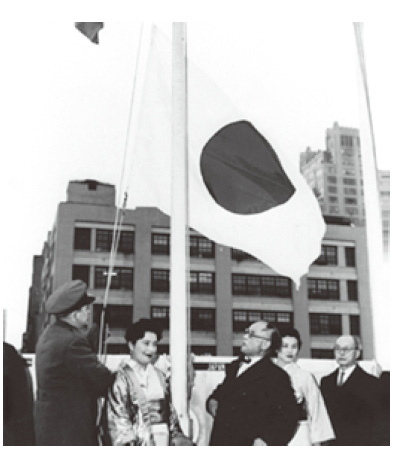 Accretion to the Un ⒸUn Photo/MB
Accretion to the Un ⒸUn Photo/MB
Japan has not merely reaped the benefits of such international frameworks every bit the UN and the gratuitous trade system; it has likewise worked to farther strengthen these frameworks. As a responsible member of the international community, Japan has consistently maintained its position to contribute to peace and prosperity in Asia and the world.
In item, Japan has attached the importance to its relations with Asian countries. Nippon has not only contributed to their economic development and political stability simply has also developed "center-to-eye" relationship of mutual trust among the region and worked together as equal partners in wide-ranging fields, including social and cultural fields.
Japan solidified democracy and became the first country in Asia to enjoy "prosperity", through its recovery from the ashes of war and achieving high economic growth. Information technology besides overcame environmental and social problems and created a social system for condom and secure daily life. In this regard, Japan has provided a model of nation-edifice to many Asian countries. Investment and applied science transfers from Japan helped to elevate living standards of people in Asia and the world and to create a prophylactic and secure society. Nippon's contribution to the Asian development has been highly appreciated past the Asian countries. Nippon is lauded as a country that has a positive influence in the earth.1
Japan'due south path over the terminal 70 years as a peace-loving nation is deeply ingrained among the Japanese people and will never sway. Japan volition cooperate with other countries and contribute fifty-fifty more proactively to international peace, stability and prosperity of the earth from the policy of "Proactive Contribution to Peace" based on the principle of international cooperation.
- i According to an opinion poll on Japan in Association of Southeast Asian Nation (Asean) countries (which the Ministry of Foreign Affairs commissioned to a 3rd party in 2014), 92% believed Japan was playing an agile role in the development of Asia. Amongst the areas to exist contributed by Japan, the economic aspects were highly evaluated and expected in item. Every yr, BBC in the United Kingdom carries out a global poll on countries' influence in the globe. Japan annually ranks among the height countries that take a positive influence in the world.
(2) The Path over the By seventy Years
A. Collaboration with free and democratic nations
After restoring sovereignty as an contained nation, Nihon concluded the Nihon-U.S. Security Treaty with the United States, against which Japan fought in WWII. The two countries and so formed an alliance with the Nippon-U.Due south. security arrangements at its core. The Nippon-U.S. Brotherhood became the cornerstone of peace and stability not only in Nihon, only as well in the Asia-Pacific region. While achieving its economic growth, Japan adult its defense force capability with transparency2, adhering to basic policies such as maintaining an exclusively national defense-oriented policy, non becoming a war machine power that poses a threat to other countries, and observing the Iii Non-Nuclear Principles.
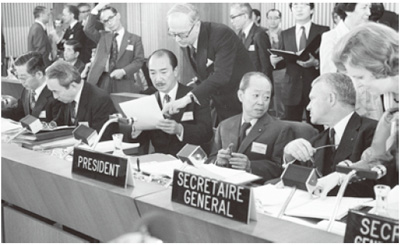 Meeting scene of the OECD in the by ⒸOECD Photo
Meeting scene of the OECD in the by ⒸOECD Photo
- 2 Nihon maintained the level of the defense budget at effectually one% of gross domestic product (Gdp).
Afterward the end of the Cold War, Japan and the United States, in the Japan-U.S. Joint Declaration on Security of 1996, reaffirmed that the Japan-U.Southward. security human relationship remains the cornerstone for achieving common security objectives, and for maintaining a stable and prosperous surround in the Asia-Pacific region as they enter the 21st century. Based on this recognition, the two countries have worked to strengthen their defense force cooperation, including the revision of the Guidelines for Japan-U.S. Defense Cooperation in 1997. Every bit the security surroundings in E Asia becomes more severe and threats in the international community diversify, the Nippon-U.S. Brotherhood is further growing in significance for peace, stability, and prosperity in the region and the international customs.
Japan, in the process of economic growth, reaped substantial benefits from the gratuitous trade arrangement, epitomized by General Agreement on Tariffs and Trade (GATT) and the World Merchandise System (WTO).3 Japan actively took office in the complimentary trading negotiations and contributed to realizing a multilateral and non-discriminatory free trade system. International organizations and frameworks, notably the Group of 7 (G7)/the Group of Viii (G8), the Organization for Economic Co-operation and Evolution (OECD), the Globe Bank, and the International Monetary Fund (International monetary fund), played a major role ensuring that the free economy achieves stable economic growth and becomes the underlying economic arrangement that brings prosperity to the world. Japan participated in the making of this order that forms the foundation of the global economy, and has supported and promoted this organization.
- 3 WTO was established in 1995 as an international organization that advances the free trading system to succeed GATT.
B. Together with countries in Asia
Since the finish of the state of war, Nippon, every bit a member of Asia has striven to achieve reconciliation and forge new relations with Asian countries. Japan has sincerely dealt with the issues of reparations, holding, and claims pertaining to the war, in accordance with the San Francisco Peace Treaty and other relevant international agreements and instruments. Japan has walked the postwar path with countries in Asia, edifice on Japan'due south deep remorse over the war. Based on the path it has taken, Japan will develop futurity-oriented cooperative relations with Asian countries, including People's republic of china, the Democracy of Korea (ROK), and Southeast Asian nations.
The yr 1954 marked the first of Japan's Official Evolution Assistance (ODA). Nippon steadily increased its ODA contributions and was the largest donor in the world for virtually of the 1990s. Japan'south focused support and technical cooperation to Asian countries in particular were aimed at infrastructure development and improvements in didactics indispensable to economic development in the ROK, People's republic of china, and Clan of Southeast Asian Nation (Association of southeast asian nations) fellow member states. In providing ODA, Japan fastened importance to the buying of the recipient countries, while drawing on the feel and knowhow from Japan's own recovery and economic growth. Through dialogue and collaboration, Japan has contributed to human resource evolution and institutional evolution.
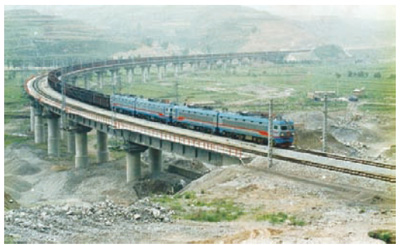 Help to the infrastructure development (Shenmu-Shuoxian railway structure project)(China)(Source: JICA)
Help to the infrastructure development (Shenmu-Shuoxian railway structure project)(China)(Source: JICA)
In addition to ODA, the synergistic effects of Japanese companies' investment in Southeast Asian countries and other countries gave ascent to virtuous cycles. Namely, Japanese companies' evolution of supply chains and value bondage on a global scale has a reciprocal influence with Asian countries' economic growth. Accordingly, Japan provided non only appurtenances, technologies and capital, simply it also scaled upwards safe, secure and prosperous societies in the region.
C. Working with the UN and the international community
Nippon, together with the international community, has been addressing diverse issues and has fabricated sincere efforts to resolve them, based on the principle of international cooperation, centering on the collaboration with the UN.
Equally the only country to take ever suffered the destruction of atomic bombings during war, Japan has consistently placed importance on disarmament and non-proliferation efforts. Notably, with regard to nuclear weapons, Nippon has not only upheld the Three Non-Nuclear Principles, but has also fabricated a serial of diplomatic efforts to realize a world free of nuclear weapons. Japan continues to play a leading part in international efforts to achieve a globe free of nuclear weapons.
The role of Japan's ODA is not confined to Asia. Following the end of the Cold War, when international interest in Africa declined, Japan launched a development initiative called the Tokyo International Briefing on African Development (TICAD), and has been playing a leading role in the development of Africa to date.
Japan has emphasized the principle of human security which focuses on threats that each individual faces. Based on this principle Japan has extended thorough support that reaches the grassroots level, and engaged proactively in the activities to consolidate the principle in the international community.
Japan draws to the maximum extent on its experiences and knowhow to help solve new issues confronting developing countries stemming from social development and globalization. Japan'south rubber, secure and prosperous order was not congenital overnight. Japan overcame challenges as a welfare nation in the process of its postwar recovery and economic growth, which were achieved as a effect of its efforts of the people. The challenges included new issues, such as ecology pollution and air pollution caused by industrialization, and the establishment of medical and universal wellness insurance systems. The skills and human resources that were fostered in this process have fulfilled a vital office in helping to solve environmental and health problems in developing countries. Japan provides keys to solving the new challenges facing many developing countries, including Japan'due south world-leading disaster risk reduction technologies, and development of legal and judicial system that is increasing in importance along with economical development.
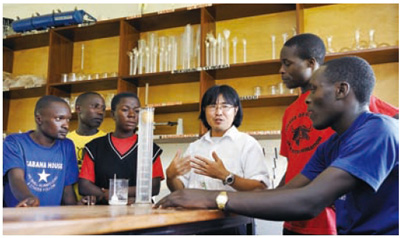 Assistance to the education comeback, Strengthening of Science and Mathematics Education (Uganda)(Source: Kouji Sato/JICA)
Assistance to the education comeback, Strengthening of Science and Mathematics Education (Uganda)(Source: Kouji Sato/JICA)
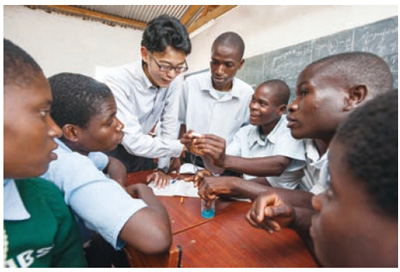 Nippon Overseas Cooperation Volunteer taking active roles in the developing country (Malawi)(Source: Kenshiro Imamura/JICA)
Nippon Overseas Cooperation Volunteer taking active roles in the developing country (Malawi)(Source: Kenshiro Imamura/JICA)
The Japanese people who work shoulder to shoulder with local stakeholders for the evolution of developing countries are a clear analogy of Japan as a "peace-loving nation." Endless experts and Japan International Cooperation Agency (JICA) volunteers, including volunteers from the Japan Overseas Cooperation Volunteer (JOCV) program that marks its 50th anniversary this yr, have been dispatched to developing countries to provide support leveraging Japanese knowhow. They work hard with local stakeholders while deepening their kizuna (bonds of friendship). In addition, Nippon has hosted many trainees from developing countries and provided opportunities to share not merely Japanese technologies and knowhow just also Nippon's professional ethics and spirit.
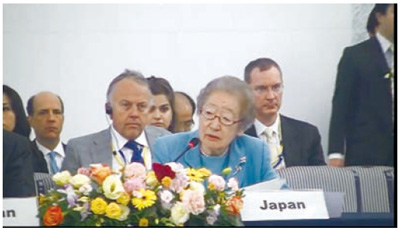 Tokyo Briefing on Transitional islamic state of afghanistan (July eight, 2012 Tokyo)
Tokyo Briefing on Transitional islamic state of afghanistan (July eight, 2012 Tokyo)
Well-nigh conflicts during the Cold War reflected the ideology-based confrontation between the E and W camps and had a strong character of proxy wars. After the cease of the Cold War this conflict structure lost its significance, and conflicts betwixt indigenous and religious groups increased in various regions. In this context, Nippon's strange policy has causeless a greater function in settling these conflicts peacefully and diplomatically. Japan indeed has expanded its diplomatic role in the new international surroundings.
In Cambodia, which suffered a prolonged civil war, Japan's creative diplomatic efforts towards peace, coupled with the diplomatic efforts of the international community, played a significant part in ending the ceremonious war and establishing a democratic government through elections.
In Japan, the Act on Cooperation with United Nations Peacekeeping Operations and Other Operations (PKO Human activity) was enacted in 1992, based on the recognition that Nippon should contribute proactively to international peace and stability. In accordance with the Act, Nippon has assisted consolidation of peace in such places as Cambodia, Mozambique, the Golan Heights, and Timor-Leste. At present, Headquarters staff and applied science units of the Japan Self-Defence (JSDF) take been dispatched to Due south Sudan, which has recently gained independence. Their activities are being collaborated with ODA to make contributions towards peace, stability and nation-building in South Sudan, including infrastructure development.
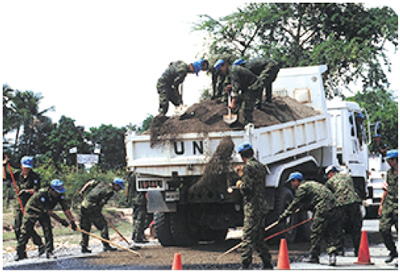 SDF personnel operating in Cambodia (UNTAC)
SDF personnel operating in Cambodia (UNTAC)
The Act of Punishment and Countermeasures confronting Piracy (Piracy Countermeasures Act) was enacted in 2009 in recognition that it is critically important for Nihon and the international community of ensuring maritime transport security. Nippon has been engaged in anti-piracy activities off the coast of Somalia and in the Gulf of Aden in accord with this Deed, contributing to the international cooperation related to the escort of vessels navigating these waters.
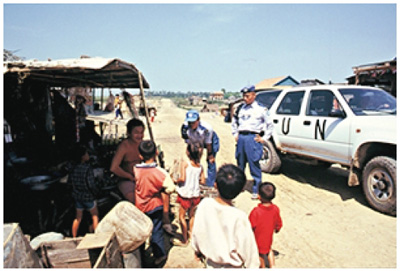 Japanese police officers operating in Kingdom of cambodia
Japanese police officers operating in Kingdom of cambodia
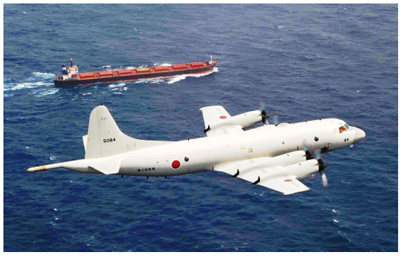 Contribution in anti-piracy activities (Source: Ministry of Defense)
Contribution in anti-piracy activities (Source: Ministry of Defense)
(3) New Challenges and "Proactive Contributor to Peace"
From the start of this century, the global ability balance has inverse dramatically, and there accept been rapid advances in globalization and technological innovations. This has brought with information technology rising threats and diversifying risks, such every bit weapons of mass destruction and ballistic missiles, international terrorist organizations, and cyber attacks. In an era when threats to the security of the nation and people are diversifying, no country tin can achieve neither peace and security, nor a prosperous future only past itself.
In that location is no doubtfulness whatsoever that Nihon will continue forth the path of a "peace-loving nation." Building upon the path it has taken, Japan, from the policy of "Proactive Contribution to Peace" based on the principle of international cooperation, volition move forward to a bright time to come. Thereby, Japan, working more closely with the U.s.a. and other relevant countries, will realize its own security as well as peace and stability of the Asia-Pacific region, and contribute fifty-fifty more proactively to ensuring peace, stability and prosperity of the international community.
Source: https://www.mofa.go.jp/policy/other/bluebook/2015/html/chapter1/c0101.html
0 Response to "The Japanese Has Done It Again"
Post a Comment